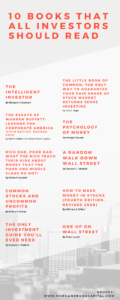Focusing on investments can offer a variety of opportunities, each one associated with more or less risk, depending on the field. Many of us aspire to be savvy with money, but sometimes it’s difficult to know where to begin. Having a thorough understanding of the rules and trends in the market (and remaining on top of them as they change) is vital.
Even seasoned pros should reconsider their tips and techniques now and again. It always pays off to see how other investors have excelled. Check out these ten books that all investors, whether an expert or novice, should read so they can discover or remind themselves of what others did right and how they’ve strategized to maintain financial success.
The Intelligent Investor
By Benjamin Graham
Known as the godfather of value investing, Benjamin Graham was a renowned economist, professor and investor. Published in 1949, the book is unique from other investing books in its approach. It doesn’t tell you how to make millions, but how not to lose your marbles while investing. Offering must-know basics to get started in investing and give you momentum for a long time, the book shares recommended strategies, how to analyze stocks and offers an important history lesson of the stock market. Warren Buffet has called The Intelligent Investor one of the best books on investing ever written. Wall Street Journal columnist Jason Zweig offers commentary in the revised edition.
The Little Book of Common: The Only Way to Guarantee Your Fair Share of Stock Market Returns Sense Investing
By John C. Bogle
Author John C. Bogle is known for creating the first-ever index fund, so it’s safe to say he knew a lot about investing. As the founder of Vanguard Group, it was rumored that Bogle and Buffett were best friends. Buffet also gave his endorsement to this book, noting that “investors large and small” should read it.
The book argues that for many investors, the stock market is a lose-lose bet, but Bogle explains what he learned to turn the odds in his favor. While this isn’t his only acclaimed book, it’s the one that covers all of his own innovative techniques and experiences in a short and easy read.
The Psychology of Money
By Morgan Housel
Being successful with money isn’t always about what you know, but how you behave. In this book by award-winning author Morgan Housel. Money (investing, personal finance and strategic business decisions) are made in math-based fields, but this book offers interesting and practical ways to why we make bad financial decisions and the ways to make better ones. Housel shares 19 short stories that explore the strange ways people think about finance and teaches how to make more sense of the importance of managing your mindset on wealth.
The Essays of Warren Buffett: Lessons for Corporate America (Fifth edition, revised 2019)
By Warren Buffett and Lawrence Cunningham
If you want to learn from one of the most successful investors of all time, learn from Warren Buffet. In this book, he takes the time to share what he has learned about investing over the years. And while he doesn’t often comment on the specifics on individual stock holdings, Buffet remains transparent about the principles behind investing. While the book’s title addresses corporate America, readers can include, the book offers a glimpse into the relationship between corporations and shareholders and is presented as a collection of letters he wrote to shareholders over a period of five decades. It’s ideal for those new to investing.
Rich Dad, Poor Dad: What the Rich Teach Their Kids About Money That the Poor and Middle Class Do Not!
by Robert Kiyosaki
Considered one of the most classic investing memoirs, this book has garnered some of the most influential personal finance and investment advice since it was first published over 20 years ago. Author Robert Kiyosaki relates his story of growing up with two dads, his real father and his best friend’s father, otherwise known as his “rich dad”. Both men influenced Kiyoaski’s views on investing. The book is inspirational to many while remaining candid as it challenges the myth that you need to earn a high income to become wealthy. It’s also beloved for explaining its differences between working for money and understanding that your money can work for you.
A Random Walk Down Wall Street
By Burton G. Malkiel
Investing well doesn’t mean you have to devote hours to managing a broad-based extensive portfolio. This book is priceless material for those who are starting their first 401ks. Malkiel’s book includes helpful definitions of investment terms and it applies them to various investment strategies in different stages of your life. He puts a crucial emphasis on long-term investments over get-rich-quick scenarios. While Malkiel cautions that no amount of technical analysis will help investors beat the market, readers will earn takeaways about how to predict prices and avoid common downfalls.
How to Make Money in Stocks by (Fourth edition, revised 2009)
By William J. O’Neil
The founder of Investor’s Business Daily, a national publisher of daily financial newspapers, Bill O’Neil created the CAN SLIM system of choosing stocks, where each letter in the acronym represents a critical factor to look for when purchasing shares in a company. This book is a great place to start because it avoids generalities and provides tangible ideas that readers can immediately apply to your research.
One Up on Wall Street
By Peter Lynch
Even if readers are new to investing, it doesn’t mean they can’t do well or even better than some pros. In this book, Peter Lynch maintains that new investors have everything they need to know at their fingertips. Lynch argues that viable investment opportunities are everywhere. They only need to identify the practical and innovative options from the trends. If they can identify which ones to choose, they can be steps ahead of everyone else. The book has sold over 1 million copies since its release in 2000 and regularly makes the list on many of the top-rated investment books.
Common Stocks and Uncommon Profits
By Philip A. Fisher
A pioneer in the field of financial analysis, Philip Fisher remains a major influence on modern investment theory and is recognized as the creator of the idea to analyze stocks based on their growth potential. This classic book teaches investors to analyze the quality of a business and its ability to produce profits. First published in the 1950s, these lessons are as relevant today as they were over half-century ago, even in our changing economy.


